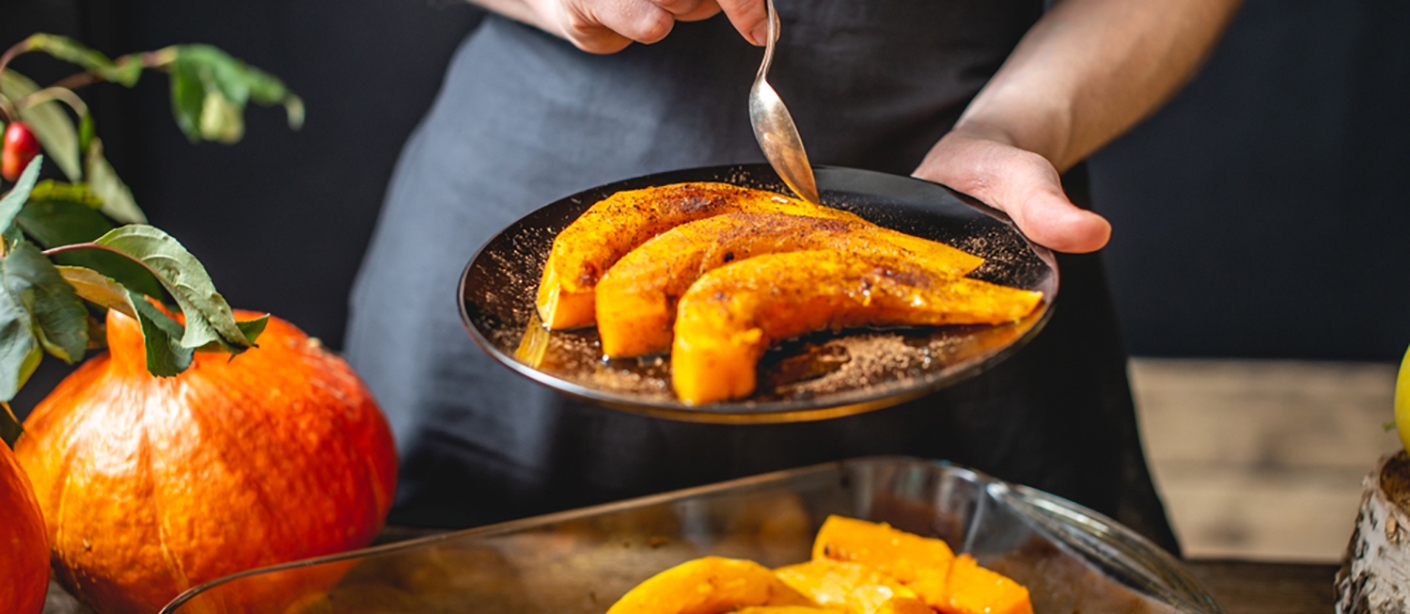Pumpkin is a highly nutrient dense food, rich in vitamins and minerals. Here is what one cup of cubed pumpkin contains.
- Calories: 30
- Protein: 1.2 g
- Carbs: 8
- Fat: 0.1 g
- Sugar: 3.2 g
- Fiber: 0.6 g
- Sodium: 1 mg
In fact, the good-for-you nutrients in pumpkin can transform a wide variety of foods and meals into healthier offerings. Here are five ways that pumpkin benefits your health, plus simple ways to eat more of it.
Fill Up With Fiber
With only 49 calories and nearly 3 grams of fiber in every cup, canned pumpkin can be used in meals to help with weight management.
"Incorporating fiber can help you feel fuller longer, effortlessly helping you get from one meal to the next without snacking," explains Pamela Nisevich Bede, a registered dietitian with Abbott's scientific and medical affairs team.
Incorporating more fiber into your diet may help reduce your risk of heart disease, as it has been shown to help lower blood pressure and cholesterol. Fiber also aids digestion, combats constipation and can improve gut health, which, in turn, can help strengthen your immune system.
Improved Memory and Concentration
Pumpkin is a great source of lutein, a brain-boosting carotenoid.
"Lutein is a powerful nutrient compound, widely recognized for its critical role in eye health, but our research suggests it could also improve cognitive function — from learning and memory to concentration and focus," says Matthew Kuchan, Ph.D., is a discovery scientist and leads research on the impact of nutrition on cognition and memory.
Additionally, supplementation of lutein and another carotenoid called zeaxanthin may help improve visual processing speed, according to a study in the journal Archives of Biochemistry and Biophysics.
A Stronger Immune System
Pumpkin is also a source of zinc, vitamin A and vitamin C — all antioxidants that help support the immune system. It also contains beta-carotene, the carotenoid and antioxidant that gives pumpkin its bright orange color. Find 17 percent of your daily recommended value of vitamin C in one cup
Pumpkin is a great source of vitamin E, iron and folate too.
Have an upcoming important trip? Or just trying to improve your immunity? Try snacking on some pumpkin seeds.
For Sharper Eyesight
One cooked cup of pumpkin contains over 200% of your recommended daily intake of Vitamin A. The beta-carotene and carotenoids in pumpkin are converted to vitamin A in the body. According to the American Academy of Ophthalmology, vitamin A can help to stimulate the production of certain pigments that are essential for good vision — particularly for night vision.
"To increase your daily intake of vitamin A, you can easily add one cup of cooked, mashed pumpkin to your daily smoothie or morning oatmeal," says Nisevich Bede.
Better Sleep and Mood
Pumpkin benefits may even apply to the hours that you're asleep. You've probably heard someone say that Thanksgiving turkey always makes them drowsy. Well, it might not be entirely the turkey's fault. While tryptophan is an essential amino acid that's present in turkey and has been shown to increase feelings of sleepiness, it's also prominent in pumpkin.
"Since the body cannot make tryptophan on its own, pumpkin seeds are an easy, versatile way to add it into your diet," Nisevich Bede says.
Pumpkin Seeds for the Win
Don’t throw out those seeds. Pumpkin seeds are packed with goodness including vitamins, minerals, antioxidants including lutein and vitamin e, protein, healthy fats, and fiber. They are perfect sprinkled over salads, in soups or in oatmeal. Or even grab a handful when you are on the go.
It may be a fall classic, but the nutrients in pumpkin can be a healthy addition to your diet any time of year.




Social Share